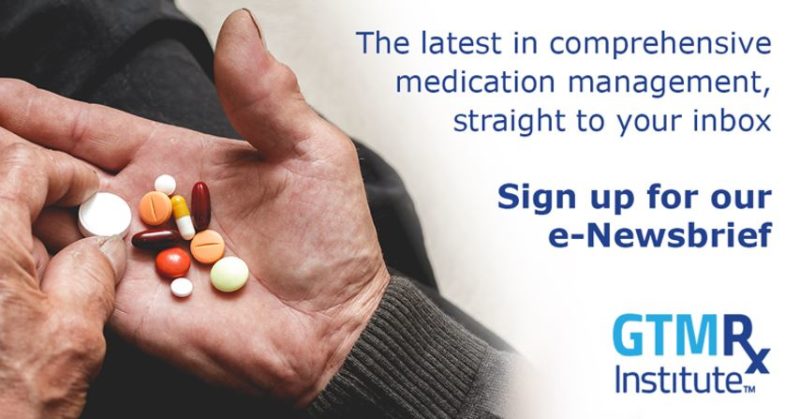Practice Transformation
In an opinion piece for STAT News, Brian Barnett, MD, of the Cleveland Clinic and Case Western Reserve University School of Medicine, makes a case against prior authorization. It puts patients in the crossfire between pharmaceutical companies, PBMs and insurers, he argues. “Being regularly compelled by insurers to reconsider and justify treatment decisions we have made in our patients’ best interests, providers are increasingly wondering who’s actually doing the prescribing — us or people with no medical training who know our patients’ names only because they’re reading them on computer screens?” (STAT News)
Primary care physicians are under tremendous pressure, writes Paul Grundy, MD, president, GTMRx Institute. We make them responsible for every aspect of patient care—including medication. This is a huge burden on the doctor—and the wrong approach to medication management. To relieve the burden and improve medication outcomes, comprehensive medication management is the solution. It’s “the best way to bring about the changes we need. Optimal patient care cannot happen without a systematic approach to medication use. It’s that simple. We have to get the medications right, or we are failing our patients.” (Health IT Answers)
Evidence & Innovation
Medicare Part D spent more than twice as much on hundreds of prescription drugs than the Department of Veterans Affairs in 2017, largely, because the VA could negotiate prices directly with drug makers, according to a new GAO report. The VA paid 54% less on average for 399 brand-name and generic medicines, even after rebates and discounts. Breaking it down, the VA paid 68% less for 203 generics and 49% less for 196 brand-name drugs. Only 43 drugs were cheaper in Medicare than in VA. (GAO report; STAT News)
YouTube wants to be a reliable source of health information, and it has hired Garth Graham, MD, as its director and global head of healthcare. He previously served as CVS’ chief community health officer and president of the Aetna Foundation. People are already going to sites like YouTube in their daily lives, and this is one way to meet them more effectively where they are, he tells Fierce Healthcare. This is especially true for underserved or minority communities. (Fierce Healthcare)
The generics business has captured the attention of billionaire investor Mark Cuban. He has launched a generic drug company eponymously named Mark Cuban Cost Plus Drug Company. According to the company, it is dedicated to producing low-cost versions of high-cost generic drugs. It pledges to provide ”radical” pricing transparency. It will publish the costs to manufacture, distribute and market its drugs to pharmacies. There will be no intermediaries and no rebates for insurance companies, the company promises. The company simply adds a flat 15%. (Becker’s Hospital Review)
Policy Solutions
Under the Biden administration, many expect the FTC to take a tougher stand on some pharmaceutical industry practices, including anti-competitive behavior that affects the cost of prescription drug prices. According to STAT News, two developments are behind this expectation. One of them is the growing concern over the extent to which rebates, paid by drug makers, choke competition. The other is that the Democratic FTC commissioners have taken a strong anti-trust—and anti-merger—position. (STAT News)
Note: sources that have an asterisk require login to view the article.
In Case You Missed It!
Dr. Howard L. McLeod, Pharm.D., FASCO, FCCP, medical director, Geriatric Oncology Consortium; professor of pharmacy, University of South Florida spoke to the Precision Medicine Workgroup on Friday, January 22. Dr. McLeod presented on the reimbursement of PGx along with the service delivery component—analysis and interpretation of results. In addition, he covered reimbursement barriers, what the horizon for payment and policy reform looks like and examples of successful or promising reimbursement models.
The Get the Medications Right Institute (GTMRx) workgroups have developed a set of Tools from Our Experts to advocate for medication management reform. These tools are designed to be useful resources for all stakeholders, and we believe these will be vital to optimize medication use through CMM in practice. We encourage you to share them, post them and use them to advocate for medication management reform. Find these guidance documents here.
Learn about peer-reviewed evidence supporting pharmacogenomics (PGx) integrated into CMM team-based care which can produce decreased costs, increased provider education and patient satisfaction, access to care and outcomes. See the demonstrated impact of PGx as a tool used during the delivery of CMM services and how it allows for precisely fitted and delivered medical care based on the unique characteristics of an individual’s genetic profile, lifestyle and environment. Developed by the Precision Medicine Enablement via Advanced Diagnostics Workgroup, read the document here.
ICYMI Blog: Marcia Buck, Pharm.D. & M. Shawn McFarland, Pharm.D. | CMM vs. MTM: Patient-focused process vs. medication-focused activity
Nearly 75% of primary care visits involve medication prescribing. It’s how we treat most conditions. But we still haven’t managed to get the medications right. Here’s the problem: Non-optimized medication therapy leads to more than 275,000 avoidable deaths each year, and it costs the nation over $528 billion annually. What do we mean by non-optimized medication therapy? It’s the misuse, underuse and overuse of medication therapy. People are dying because their medications are not being managed to ensure appropriate use. Read more here.
Listen here.
Hosted by the GTMRx Institute’s executive director and co-founder, Katherine H. Capps, Voices of Change features leaders who have knowledge, experience and ideas to solve this urgent need to get the medications right. Did you miss the most recent episode? Liz Helms discuss the patient’s perspective in getting the medications right, saying, “[Patients] need to ask the questions. We need to understand why we’re taking that, and if we’re taking multiple medicines, then we need to understand if they all work together. And if they don’t all work together, then there should be conversations [on] what should we do to change that?”
Episodes feature:
- Liz Helms, president and CEO of the California Chronic Care Coalition
- Liz Fowler, JD, Ph.D., executive vice president for programs, The Commonwealth Fund
- Amy Gutierrez, Pharm.D.,senior vice president and chief pharmacy officer, Kaiser Permanente
- Amanda Brummel, PharmD, BCACP, vice president, Clinical Ambulatory Pharmacy Services, Fairview Pharmacy Services
- Orsula V. Knowlton, PharmD, MBA, president and chief marketing & new business development officer, Tabula Rasa HealthCare
- Anand Parekh, MD, chief medical advisor, Bipartisan Policy Center
- Paul Grundy, MD, president, GTMRx; chief transformation officer, Innovaccer
AmazonSmile is an easy way for 0.5% of your qualified purchases go to the GTMRx Foundation at no cost to you. And signing up is simple—go to smile.amazon.com and select “Get the Medications Right Foundation” as your charity of choice. If you prefer to directly donate instead, you can do so here.
Adding the foundation on AmazonSmile will help us continue to provide no cost educational webinars, issue briefs, weekly news briefs and promote the need for transformation of our current system of medication use through social media campaigns.





